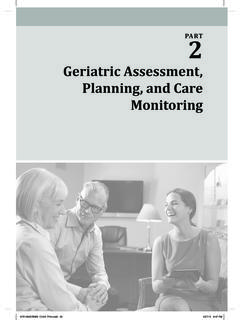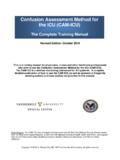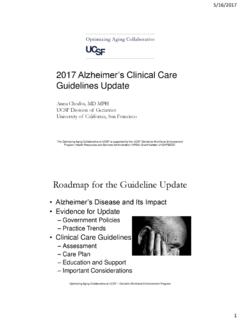Transcription of Israel - OECD.org
1 Israel * Long-term care 18 May 2011 OECD (2011), Help Wanted? Providing and Paying for Long-Term care , Paris, and Key Facts In 2009, of the Israeli population was 65 years old and over; and this rate is expected to reach 14% by 2030 ( Israel Central Bureau of Statistics, 2010a, 2010b). The share of the population aged 75 and over, in the population over the age of 65, increased from in 1995 to in 2009 ( Israel Central Bureau of Statistics, 1996, 2010a). In December 2010, there were 143,912 long-term care (LTCI) beneficiaries ( Israel National Insurance Institute). In 2007 approximately 20% of the over 65 population was institutionalised (Brodsky, 2009). In 2008, there were 42 beds in institutions per 1000 elderly people (Brodsky et al, 2010). Between 1988 and 2010, the Israeli government spent approximately $ billion (in 2010 prices) on home care services ( Israel National Insurance Institute, various years).
2 Background The Israeli parliament passed the initial framework law for LTCI in 1980, authorizing the Israel National Insurance Institute (NII) to collect LTCI fees. In April 1988 LTCI benefits were introduced for the first time. The LTCI aimed at complementing, rather than replacing, the limited system of service provision in place. The Ministry of Welfare and Social Affairs bears the responsibility of institutional care , personal care , and home services for the semi-independent (those who have some ADL dependency), as well as for the frail elderly (those who have moderate ADL limitations). It is also responsible for day care and sheltered housing. The Ministry of Health is responsible for the severely dependent and mentally frail elderly. Personal and home services for the semi-independent, frail and severely disabled and mentally frail elderly living in the community are under the responsibility of the NII (Borowski and Schmid, 2001; Schmid, 2009).
3 care provision The LTCI Law, a section of the National Insurance Law, includes provisions for the establishment of internal or quasi markets. This involves the contracting of service delivery to authorised voluntary non-profit and for-profit organisations. Local professional committees are responsible for evaluating the needs of beneficiaries and for deciding which agencies are appropriate for providing LTC services (Schmid, 2009). Personal care is delivered by paraprofessionals, about two-thirds of them Israelis and a third foreign-born workers ( Israel National Insurance Institute). Benefits and Eligibility Criteria The processing of applications for benefits under the LTCI involves, firstly, the establishment of initial eligibility (residency, income test etc.) by the NII, and afterwards a dependency assessment by nurses or physiotherapists using an ADL assessment instrument.
4 Applicants aged 90 and above can submit an assessment signed by a geriatric seciallist medical doctor instead of a dependency assessment ( Israel National Insurance Institute). The LTCI covers disabled men aged 67 and over and disabled women of 62 years of age and over who are permanent residents of Israel . It also covers new immigrants who arrived in Israel after reaching retirement age. Eligibility is subject to an income test. Its upper limits are times and times the average wage for individuals and couples, respectively, thus excluding only of applicants from benefit entitlement in 2010 ( Israel National Insurance Institute). The benefits provided by the LTCI are specified in-kind services, while cash benefits are provided only on limited occasions. In kind services include personal care , limited household management, supervision, personal care in day- care centers, absorption products, emergency transmitters and laundry services.
5 Depending on the score yielded by the assessments, an individual may be eligible for , 16 or 18 hours of care per week. Employers of Israeli caregivers entitled to 16 or 18 hours of care per week receive an additional 3 or 4 hours of care per work, respectively. The precise service Israel * Long-term care 18 May 2011 OECD (2011), Help Wanted? Providing and Paying for Long-Term care , Paris, and mix is determined by local professional committees funded by the NII. These committees are headed by social workers employed by the municipality; other members include a nurse from the General Sick Fund (the largest public not-for-profit healthcare insurer and provider in Israel ) and a claim officer of the NII ( Israel National Insurance Institute). Since 2008, an experimental cash-benefit scheme has been implemented, under which elderly individuals with an assessed level of dependency have the option to receive cash rather than in-kind benefits.
6 Elderly people living in one of the experiment areas can elect to recieve a cash payment if they score at least 6 points in the dependency test and are actually recieving long-term services from a caregiver who is not a family member for most of the day and for six days a week. In December 2010, only of the potential recipients chose to receive the cash benefit ( Israel National Insurance Institute; Shmelzer, 2010). Funding and Coverage The responsibility for the financing of LTC services is borne by the government and by private and voluntary agencies. Public financing comes from revenue from the State s general budget and earmarked taxation collected by the NII. Private funding accounts for of the total LTC financing, and includes commercial insurance of different types, as well as out-of-pocket payments (Borowski and Schmid, 2001; Chernikovsky et al, 2010).
7 Starting on April 1, 2011, the LTCI Law provides for employer and employee contributions of a total of of wages each. The contributions levied on employers are up to of wages. The employees contributions are up to of wages. The government contributes of wages ( Israel National Insurance Institute). Caregivers LTCI has reduced the financial burden of caring for the elderly, borne by either themselves or by their caregivers. This is reflected in a significant reduction in the purchase of private home- care services. However, there has not been a decrease in the number of hours of care provided by informal caregivers. Indeed, a follow-up study carried out one year after LTCI implementation showed that primary caregivers provided on average 23 hours of care per week, compared to 21 hours per week prior to the law s implementation. This could partly be explained by the strong tradition of children caring for their parents, which is usually found in Israel (Borowski and Schmid, 2001; Schmid, 2009).
8 References Borowski A. and Schmid H. (2001) Israel s long-term care insurance law after a decade of implementation , Journal of Aging and Social Policy, 12(1): 49-71 (accessed on 01/12/2010) Brodsky J. (2009) Home and community based services versus institutional care , International Expert Meeting on "Monitoring Long-Term care for the Elderly , 7-9 September 2009, Jerusalem, Israel (accessed on 01/12/2010) Brodsky J. et al (2010) The Elderly in Israel : Statistical Abstract 2009, Jerusalem: The Brookdale Institute [in Hebrew] Chernikovsky D. et al (2010) Long-term care in Israel : Challenges and reform policies , Health Policy: 96:217-225 (accessed on 01/12/2010) Israel Central Bureau of Statistics (1996) Statistical Abstract of Israel 1996, Jerusalem: Central Bureau of Statistics [in Hebrew] Israel * Long-term care 18 May 2011 OECD (2011), Help Wanted? Providing and Paying for Long-Term care , Paris, and Israel Central Bureau of Statistics (2010a) Statistical Abstract of Israel 2010, Jerusalem: Central Bureau of Statistics [in Hebrew] Israeal Central Bureau of Statistics (2010b) 'Selected Data for the International Senior Citizen's Day', Press Release, 21 September 2010 [in Hebrew].
9 Israel National Insurance Institute. Information and Data Retrieved from the Research and Planning Administration. 1 March 2011. Israel National Insurance Institue (Various Years) Annual Survey, Jerusalem: National Insurance Institute, Research and Planning Authority. Schmid H. (2009) Israel s long-term care insurance scheme , International Expert Meeting on "Monitoring Long-Term care for the Elderly", 7 - 9 September 2009, Jerusalem, Israel (accessed on 01/12/2010) Shmelzer M. (2010) Long-term care insurance in Israel . Pilot for cash benefits , OECD Long-term care Expert Meeting, November 2010. * The statistical data for Israel are supplied by and under the responsibility of the relevant Israeli authorities. The use of such data by the OECD is without prejudice to the status of the Golan Heights, East Jerusalem and Israeli settlements in the West Bank under the terms of international law.
10















